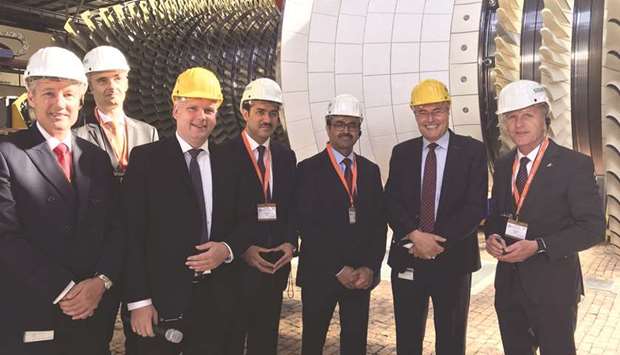HE Minister of Energy and Industry Dr Mohammed bin Saleh al-Sada affirmed that Qatar’s large gas reserves require an expansion effort, adding this is why Qatar has decided to increase this sector’s growth by 30%. Al-Sada pointed out that this requires efforts in the field of finance and the provision of equipment and construction, considering that an opportunity and a suitable ground for German companies to invest in Qatar.
This came in his speech at the third session of the Qatar Germany Business and Investment Forum (QGBIF) in Berlin, which was held under the title “Industrial development: Key to Doha and Berlin to diversify sources of income.”
Al-Sada said: “We invest gas reserves to diversify sources of income, which is in line with the objectives of Qatar National Vision 2030. One of these sources is industry that we use to diversify our sources of income that open up investment-stimulating areas, coupled with what Qatar has taken in this regard to stimulate the private sector to achieve investment growth.” He stressed that diversifying sources of income is not an objective as much as it is a way for Qatar to strengthen the economy.
Al-Sada pointed out that the growth in the gas sector is based on a vision that recognises that gas is a strategic resource on which there is an increase in demand, coupled with an expectation of global demand for gas. The world is expected to achieve 10% growth this year, he said, predicting that the reduction in the price of Qatari gas would meet the global demand by 2030.
He added that the Gulf crisis was a blessing that was exploited well and handled wisely. “Now, after a year had passed since the crisis began, we have implemented our plans extensively to expand our business. There is a turnout of over 500%, which is a good number, and I emphasise here that knowledge-based investment is what we should focus on along with meeting market demands.”
He said that in the State of Qatar there are free zones for investment and there are areas subject to government control. In the free zones, there is a 10-year tax exemption on profit, in addition to the tax exemption on exports and imports, in addition to many incentives and facilities and ideas that we apply to attract capital and investors.
With regard to the importance of joint co-operation between Qatar and Germany, CEO and Managing Director of Qatar Petroleum Saad Sherida al-Kaabi said: “We need new technologies and Germany is a leader in the construction industry, and we aim to enhance this aspect and raise efficiency in line with QNV 2030.”Al-Kaabi said that there are many new ideas in the private sector, especially in the industrial sector, and many plans and projects presented in cooperation with the financial partners, stressing the need to strengthen relations in this area.
With regard to the development witnessed by the State of Qatar in the production of gas and opportunities for German companies to establish partnerships that contribute to this development, he said the partnership between Qatar and Germany is already exist. “We rely a lot on German technology in the petrochemical sector and in various energy facilities that require advanced technology,” he said, adding there are many opportunities in this direction.
He further noted that there were opportunities for SMEs. “We need more companies that provide services in the oil and gas sectors, both in logistics and suppliers. There are many good companies that can establish a partnership in Qatar to serve the petrochemical sector, or other areas, which free zones constitute an ideal platform to launch them,” he said.
For German companies outside Qatar, Al-Kaabi confirmed that a horizon for co-operation with them could be opened in the country’s foreign projects such as the gas receiving station in Germany. So there are many business opportunities with the German side, he said.
“At the global level, we are developing our partnership continuously and we have investments in Cyprus, Mexico, Brazil, Argentina and the United States. In Europe, we have a receiving station in Italy and the UK and we supply almost all of Europe with liquefied gas,” he said.
Qatar’s gas reserves require expansion effort: Al-Sada

Related tags :


